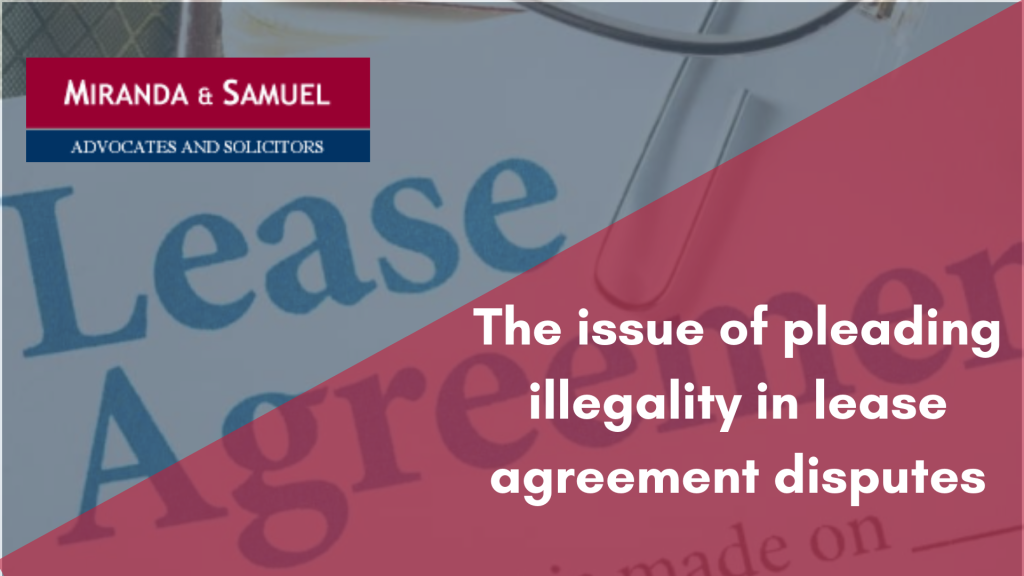Categories of land use
Land can only be used in accordance with its category of land use and the express conditionstipulated in the title. Failure to do so would amount to a breach of the condition of the land alienated and the land may be forfeited by the State Authority. Thus, landowners who intend to use the land or subdivision of the land for another category of use must first apply to the State Authority to change the category of land use. Sections 124 and 124A of the NLC provide the power to the State Authority to vary conditions imposed based on the application made by the landowner. Additional payment would be charged upon approval of the application for the change of land use.
However, what if the landowner enters into a lease with a tenant who then builds a factory for commercial use on the agricultural land, can the landowner now sue the tenant for failure to comply with the terms of the agreement and terminate the lease or can the tenant rely on the issue of illegality to dismiss the landowner’s claim?
Tan Ah Kek & Anot v Wong Thang Song & Anor [2016] CLJU 232
The appellants who are the registered proprietors of a land known as HS(M) 619 No. PT Bukit Raja, Selangor (“the land”) entered into a lease with the respondents. The respondent then built a steel structure factory on the land which is allowed under Clause 5.3 of the agreement. Nonetheless, the condition for the land use at the material time was agriculture. Following the lease, the appellants made an application to convert the land to ‘industry/commercial’ and the respondent proceeded to build the factory at the same time. However, this was refused by the authorities because the factory built on the land had encroached onto the neighbouring land.
Six years later, disputes arose between the parties which included the failure of the respondents to pay the rental on the land, the construction of the factory without first obtaining approval and the construction of a concrete dividing wall encroaching onto the neighbouring land.
At the High Court
It was argued by the appellants that the agreement was in fact contravened section 24 of the Contract Act 1950 because the category of land used was ‘agriculture’ and so the construction of the factory on the land should not be permitted. The question of illegality was then raised by the appellants at the end of the High Court trial. The respondents then argued that the issue of illegality of the agreement was never pleaded and the appellant had shown that they had made an application to convert the land from agriculture to industrial land. Thus, the appellant should not be allowed to benefit from their own failure to obtain permission for the land conversion especially after the respondents had spent a substantial sum of money to build the factory on the land. The High Court in agreeing with the respondent, held that it would be unfair to raise illegality so late in the transaction.
At the Court of Appeal
Nonetheless, when the case reached the Court of Appeal, the Court upheld the question of illegalityon the basis that the court may take cognizance of an illegality in an act or contract even if it is not pleaded by the parties. It was stated by the Court of Appeal that “the Court is duty bound to take notice of the illegality whether or not it is pleaded if the facts showing the illegality are before the Court. The duty of the Court is to give effect to the law; not to be a party to the enforcement of an illegal contract … In our views whatever the motive of the appellants in complaining only six years after the execution of the said agreement is irrelevant. What is illegal remains illegal whether the complaint is taken early upon discovery of the illegality or very much later.”
Also, taking into account the fact that the respondents despite knowing that the land use was agriculture and would require approval for conversion of land, went ahead to build the factory on the land in contravention of the condition of land use and in breach of section 115 of the NLC, the respondents are not blameless. The requirement for the conversion of land use had been clearly stated in the agreement and the respondents had taken a big risk in having the building of the factory without obtaining prior approval for conversion of land use of the land.
Thus, the contract was void under Section 24 of the Contracts Act 1950. The court had entered judgment in favour of the appellants and ordered the delivery of vacant possession of the land within 90 days from the date of the judgment.
– By George Miranda, Joy Sam Jia Qian, Kong Chai Yin –
This article is for general information purposes only and does not constitute legal or professional advice. It should not be used as a substitute for legal advice relating to your particular circumstances. Please note that the law may have changed since the date of this article.





